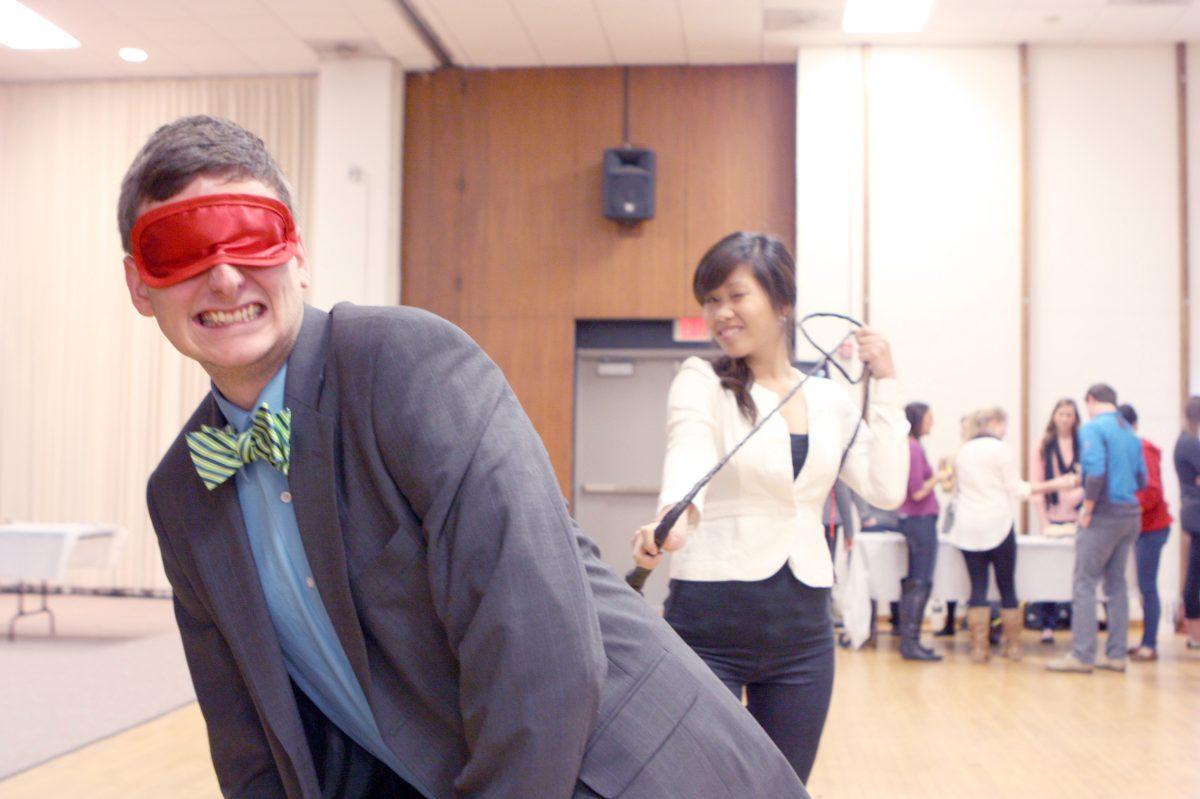A lube taste-testing, penis-shaped cakes, a spread of sex toys. These are common sights at the Sexual Communication Fair, hosted by students in associate professor Kami Kosenko’s Com 498 special topics course about sexual communication.
“It’s kind of like a kinky science fair where all the students present information on a topic of their choosing related to sex and communication,” Kosenko said.
Kosenko first implemented this class assignment in 2012, and this year’s Sexual Communication Fair will take place April 26 from 2–3:30 p.m. in the Caldwell Lounge. Attendees vote on their favorite booth to choose the winner. The prize? An automatic A+ on the final exam. Kosenko said the high stakes of the assignment have resulted in many memorable projects throughout the years.
“Last year when we had the Sex Fair, a group was putting on a demonstration involving the use of beer goggles and trying to get people to put condoms on wooden penises with the beer goggles on,” Kosenko said. “So we had a lot of very confused and off-balance individuals walking around with condoms and wooden penises.”
Although the fair tends to highlight the fun aspects of sex, Kosenko said her initial interest in sexual communication stemmed from tragedies. While in college, her high school’s prom queen died from cancer caused by HPV. Later, during her graduate studies at the University of Texas at Austin, she worked at an AIDS hospice.
“I watched over 50 individuals die of HIV and AIDS during my time there,” Kosenko said.
Seeing the effects of sexually transmitted infections influenced Kosenko to focus her work on sexual communication.
“As a communication scholar, I became particularly interested in how communication plays a role in sexually transmitted infections, both in their prevention and in bringing greater awareness to them and in just the overall management of those diseases and infections,” Kosenko said.
According to Kosenko, sexual education should start much earlier in life than it does and should include topics such as foreplay and masturbation. Kosenko said establishing national standards regarding how sexual education is taught in the United States can help in the efforts toward erasing the stigma around sex.
“In other countries where they do have more standardized sex ed that occurs earlier in a child’s educational experience, they certainly have lower STD and teen pregnancy rates than we see in the United States, which would suggest that we would benefit from following suit,” Kosenko said.
The Sexual Communication Fair will take place April 26 from 2–3:30 p.m. in Caldwell Lounge and is free and open to the public. To watch a video of Kami Kosenko discussing common questions and misconceptions related to sex, visit technicianonline.com/multimedia.
- Print edition
- Sex: It’s not that weird
- Playlist: ‘Let’s talk about sex’
- Amazon’s top 10 best-selling sex toys for online shoppers
- NCSU provides resources to promote sexual health
- GLBT Center offers safe space, counseling for all
- Greek Life works to prevent sexual assault through education
- Professor Crane-Seeber talks male feminism, rape culture
- Professor teaches Women and Men in society without using ‘he’ and ‘she’
Opinion columns:
- Re-examining hookup culture
- Taking control of birth control
- Why is violence more acceptable than sex?
- It’s on us: the stepping stones toward social awareness
Philip Misklow, a then-senior studying communication, and Thy Bui, a then-junior studying communication, display ways to spice up sex life during the Sexual Communications Fair in Talley Student Center on the evening of Thursday, Nov. 30, 2012.









